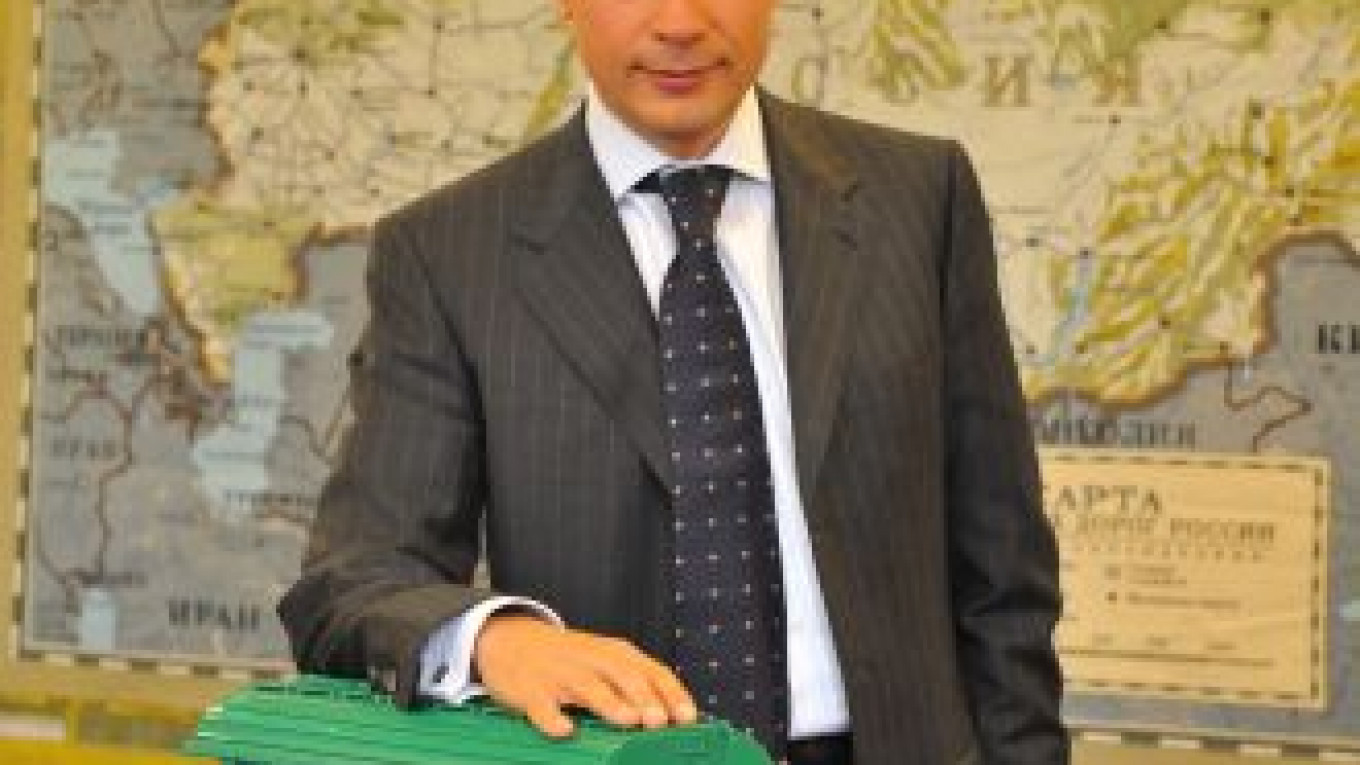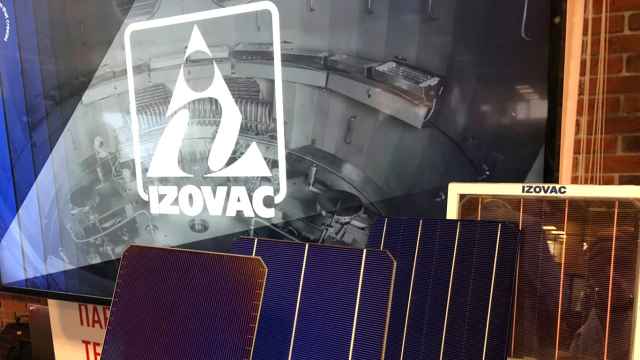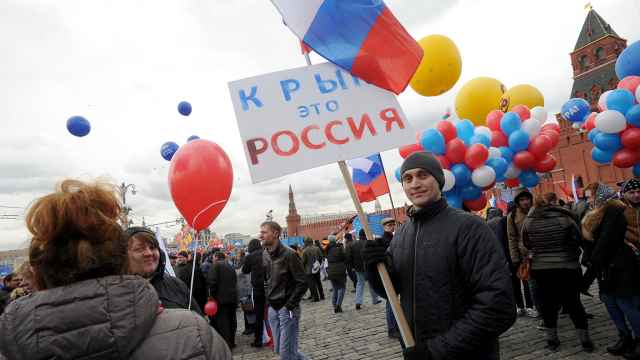Vladimir Lelekov was breaking a promise he made to the KGB in the mid-1980s. And it wasn't the first time.
"If I saw a foreigner, I was supposed to hide somewhere," Lelekov said in an interview with an American reporter.
Education
1990 — Moscow Institute of Physics and Technology (State University), Engineer, Applied Mathematics and Physics
Work Experience
2006-Present — Brunswick Rail, CEO and managing partner
2003-06 — ICT Group, including CEO of the managing company Commercial Transport Systems and board chairman of Titran, a railcar plant in Tikhvin
2000-03 — MDM Group, including deputy chairman of the management board of MDM Bank, responsible for commercial lending, non-performing assets, M&A and international fundraising (2000-02); and deputy general director of economy and finance at MDM Industrial Group, responsible for strategy, finance, legal and M&A (2002-03)
1996-2000 — IMAG Investment Management & Advisory Group, director of corporate finance
1994-96 — Sovlink Corporation, director of corporate finance
1992-94 —Russian Project Finance Bank, deputy director of oil & gas group
1990-92 — Central Bank, economist
Favorite book: “Jonathan Livingston Seagull” (1970) by Richard Bach
Reading now: Nothing. I’ve been traveling for the past three weeks. The last book I read was “Genome” (2000) by Matt Ridley
Movie pick: “Glengarry Glen Ross” (1992) directed by James Foley. This movie is about leadership, attitudes and how people take things in life. I’ve watched it perhaps five times, and every time I find something new. I would recommend that everyone in business watch this movie.
Favorite Moscow restaurant: Prichal, Ilinskoye Shosse, 2km
Weekend getaway destination: My country house. I travel often during the week, so time that I can spend at home is very valuable to me.
Lelekov signed a pledge that he would never to speak to a foreigner while studying at the Soviet Union's top engineering school, the Moscow Institute of Physics and Technology. Making the decision was easy for Lelekov, the son of a nuclear scientist who worked with reactors on top-secret submarines and satellites. Lelekov planned to follow in his father's footsteps.
"We had predetermined lives in the Soviet Union, so we didn't have a lot of freedom," he said. "But in science, we were on the leading edge in many areas — and still are. You could express yourself. You could have freedom. You could be creative. It was a great area in which to realize yourself as a person."
But the Soviet Union fell apart shortly after Lelekov graduated, offering freedoms — and burdens — he had never imagined. In the meantime, he approached Lev Vainberg, at the time one of the country's most prominent businessmen, who, among other things, had opened the country's first computer joint venture, Interquadro. Lelekov asked him for a job as a computer programmer. But Vainberg turned him down — and in so doing became the mentor who put him on track to become a businessman.
"He said, 'Look, actually we do computers, but what we really need at the moment is someone who understands how to do financial modeling,'" Lelekov said. "Financial modeling was interesting. I was generally good at mathematics, although I didn't know anything about economics. But business is half science and half art. So I learned quickly."
Even more important that financial modeling, Lelekov said, he started learning from Vainberg how to deal with people, both colleagues and customers, in a business environment.
"It is really important for someone who has just graduated from university to have a good mentor who can teach you things that you won't learn at the university, real-life tips," he said.
Lelekov, now 44 and CEO and managing partner of Brunswick Rail, a leading railcar-operating lessor, sat down with The Moscow Times at the St. Petersburg International Economic Forum in June to share real-life tips of his own, including how to make the transition from employee to boss, how Russia's imperfect courts can help fight corruption, and why well-planned leisure time is an essential part of a business strategy. Those ideas that have helped Lelekov build a fleet of freight cars from 3,700 when he joined the company in 2006 to more than 22,000 today.
Asked whether he had any regrets about going back on his promise to the KGB, Lelekov shook his head and smiled. "None at all," he said.
This interview has been edited for length and content.
Q: How did your career take off?
A: What was really interesting in the 1990s was the fact that we had no professionals in the country. As a young man who had just graduated from the university, I was allowed to do things that you would normally expect from people at a very senior level. I was allowed to handle complex negotiations and manage big projects. It was a unique time, a unique opportunity.
While working at the State Bank of the Soviet Union, which later became the Central Bank of the Russian Federation, we tackled a project with the European Bank for Reconstruction and Development to set up Russian Project Finance Bank, the first merchant banking institution in Russia. I was appointed to lead a team that negotiated the first $2 billion oil and gas framework agreement with U.S. Import-Export Bank. I was only 24 or 25 years old, and I was in charge of a $2 billion framework agreement, traveling back and forth between Washington and Moscow. It was a very romantic time in Russian history. The Soviet Union had just broken up, and we had great expectations. We worked really hard to see our dreams materialize.
Q: How did you make the leap from employee to manager?
A: The biggest challenge was to realize that I had to make the transition. I'm pretty good at doing things by myself, and when I got a document or a letter, I would always want to rewrite it to make it better. But at some point I became utterly overworked. I realized that I didn't have time to think about anything, just to work.
This is true for many leaders. When you embark on a career, you do a lot of professional work: You draw up documents, you read spreadsheets. But as you move up, you end up with less work that you need to do yourself and more managerial responsibilities. The big challenge is to manage these responsibilities. Not many people are successful at that.
When you're closer to the top at a company, your primary job is to select good people and set goals for them. Then you monitor what they are doing and encourage them. It's kind of like working as the conductor of an orchestra.
Q: What's your secret for finding and retaining talented people?
A: You have to be very open-minded and have some experience. I've attended several interviews where the management made all their conclusions based on how the candidate sat and how he was dressed. Instead, ask the candidate questions, including some that are totally unrelated to the business, like: "What do you like?" "What kind of fairy tales did you like as a child?" "What kind of music do you like?" A good candidate always has something to say. Instead of jumping to conclusions, I try to get more information and spend time reflecting. Then you can make good decisions.
Finding talent is hard work. You have to interview a lot of people. But this is how management works. They're always involved in the hiring process. I think this is one of the primary responsibilities of the CEO. According to my philosophy, I don't do anything on my own anymore. I expect my team to do the work. But if I expect quality work, I need to spend time selecting the team members.
About retaining staff, we have low turnover in our organization. Work is not just about money. We offer competitive packages for management, but it's more than that. I think that our business is interesting. We let people express themselves and take responsibility for projects.
Every year we set a goal that looks completely unreachable. But when the employees see that we have achieved it, they feel good about themselves and the company and want to remain a part of it.
We have a good workplace atmosphere — and it's very demanding. I personally don't believe that the workplace atmosphere should be 100 percent friendly. It should be a bit tense, actually, because that will make people perform better and demand more from one another. When people feel good in a high-pressure environment, they will feel happy about themselves at the end of the day. That's the most important thing.
Q: What advice would you give a foreign investor who wants to enter Russia or expand here?
A: It's particularly true for Russia that A team with B idea will perform better than B team with A idea. In other words, a good team working in even the more difficult business environment will always deliver better results than an average or mediocre team working in a great business environment.
Every investor in Russia should focus on how good and how motivated his team is and how much interest the management, shareholders and staff have in the success of the company. If you have a full alignment of interests and good leadership, you will succeed.
Pay attention to the management team. In Russia, it's all about the quality of execution. I've seen a couple of really great ideas that failed because of poor execution.
Q: Could you describe a problem that you tackled and how you resolved it?
A: Brunswick Rail is actually an interesting story for me personally. When I joined the company in 2006, it was a 2-year-old startup that hadn't signed a single contract in 12 months. No one believed in the company, not even the shareholders. They were considering selling the company. I immediately realized that there was a big disconnect, even hostility, between the company's expatriate and Russian employees. Half of the company's 30 or so employees were looking to leave.
In addition to this problem, I had to learn the business. When a new CEO joins a company, it takes some time to figure out what's going on and how things function. So I had to learn about the business and at the same time understand why the team was not working out. After we realized what was going on, I had to fire a lot of people. But then within 12 months — which is quicker than usual — we managed to put the business back on track.
Q: How do you handle bureaucracy?
A: Bureaucracy is like going through the security check at the airport. You cannot ask, "Why do I need to take off my belt? My trousers will fall down!" That would be pointless. You know that you have to follow the routine whether you like it or not. Go with the process because you can't change it.
But what you can do is develop a constructive relationship with the bureaucrats to understand what rules you need to follow and to let them know what you want. If there's an improvement that can be made, suggest it in a friendly manner. You have your own goals, and you need to fulfill them.
Q: How do you deal with corruption?
A: Corruption is the biggest problem in Russia. It started in the government and has slowly spread through all of society. Unfortunately, people have accepted it as the norm and expect you to offer them something.
We never offer incentives to our clients. The rule is: "Never offer, never accept." People come to appreciate that. Of course, it's a little bit more difficult to work this way, but you will build healthier, longer-term relationships. Legal issues are not the only reason to avoid corruption. It's kind of a moral high ground. Again, we need to feel good about ourselves.
If you cannot resolve an issue, go to court. We have filed about 25 lawsuits against the tax inspectorate. We buy a lot of freight cars, and we needed to reclaim the VAT from the tax inspectorate. But they refused to refund the VAT, and we had to go to court three times for every case. We eventually won every lawsuit. Now we have a very constructive relationship with the tax inspectorate. We get VAT refunds on time and in full, and they respect us.
This is the way you avoid corruption: just be very straightforward. If you don't like something, go to court. Yes, the court system is imperfect. But again, it's all about high-quality execution. Get your documents prepared properly and make your case crystal-clear. Then you will have a chance at winning.
Q: How do you find balance in life?
A: I work very hard. But when I have free time, I think carefully about how to invest it. How you spend weekends is important because you need to recharge yourself, you need to change your activity. When you do something different, new ideas emerge. Look at the most important decisions you've made in your life. You didn't make them after a long analysis. No, you woke up in the morning and just realized what was right. Take, for example, Isaac Newton. It's not like the apple fell from the tree and then he made some calculations that allowed him to discover the law of gravity. He was relaxing and looking at the beautiful English countryside when suddenly he had this spark of inspiration about gravity. In order to achieve breakthrough ideas, you cannot work all the time. You need to engage in other activities or spend time alone.
I chose flying and placed eighth in the Russian national aerobatics championship in 1999. I placed third in the Russian precision flying championship. Then I participated in the world championship, where I placed 54th. But I was the second-best pilot with less than 300 hours of flying time. Then I took up rally racing. I have won the Russian rally cup two times. Now I'm flying helicopters, which is great fun. I enjoy a lot of sports. I do mountain biking, cross-country skiing and alpine skiing. I swim. You have to be physically fit. When you're physically fit, you have a lot of energy. And energy is what you need to realize your dreams.
You also need courage to succeed. Don't be afraid to do what you like and what you feel is right, and the results will come. Some people say, "I'll do this job because it's professional and looks good." But then they get frustrated. They fall into a midlife crisis. People who do what they really like are typically successful people.
Related articles:
A Message from The Moscow Times:
Dear readers,
We are facing unprecedented challenges. Russia's Prosecutor General's Office has designated The Moscow Times as an "undesirable" organization, criminalizing our work and putting our staff at risk of prosecution. This follows our earlier unjust labeling as a "foreign agent."
These actions are direct attempts to silence independent journalism in Russia. The authorities claim our work "discredits the decisions of the Russian leadership." We see things differently: we strive to provide accurate, unbiased reporting on Russia.
We, the journalists of The Moscow Times, refuse to be silenced. But to continue our work, we need your help.
Your support, no matter how small, makes a world of difference. If you can, please support us monthly starting from just $2. It's quick to set up, and every contribution makes a significant impact.
By supporting The Moscow Times, you're defending open, independent journalism in the face of repression. Thank you for standing with us.
Remind me later.






